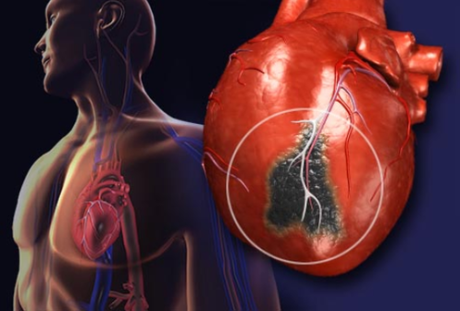We tend to think of heart attacks as a male affliction.
Not true.
While men tend to get heart attacks more than women, as many as 435,000 women have heart attacks in the U.S. each year.
In the last month, two women I knew had a heart attack. The first woman was the sister of FOTM writer joandarc, who lived in a different city and state. Her body was found in her apartment, where she had lived alone. The second woman is a former neighbor of joandarc. She also lived alone but survived her heart attack and successfully underwent a cardiac bypass surgery yesterday.

What is a heart attack?
When blood can’t get to your heart because of a blockage in an artery (from plaque buildup or a blood clot) or a malfunctioning cardiac valve, your heart muscle doesn’t get the oxygen it needs. Without oxygen, the cardiac cells can be damaged or die. It is imperative to get your blood flow restored quickly. Get medical help right away if you think you’re having symptoms of a heart attack.
Symptoms
Here are the warning signs of a heart attack:
- Pain, pressure, or discomfort in your chest.
- Pain in your neck, jaw, or shoulders.
- Shortness of breath.
- Sudden sweat or perspiration.
- Feeling faint or sick to your stomach.
Men and women can have different symptoms:
- Men are more likely to break out in a cold sweat and to feel pain move down their left arm.
- Women are more likely than men to have back or neck pain, heartburn, shortness of breath, an upset stomach, feeling queasy, throwing up, feeling very tired, light-headed, or dizzy. A couple of weeks before a heart attack, a woman might have flu-like symptoms and sleep problems. Symptoms can be so mild they’re often dismissed as something minor.
What to Do
If you or someone you’re with has symptoms that might be a heart attack:
- Call 911 right away because you’re more likely to survive if you get treated within 90 minutes.
- While you’re on the phone, the person should chew and swallow an aspirin (unless they’re allergic) to lower the risk of a blood clot.
- If the person is unconscious, hands-only CPR can double their chances of survival.
Diagnosis
- An EKG, which checks your heart’s electrical activity, can help doctors see if you’re having a heart attack, as well as show which artery is clogged or blocked.
- Doctors can also diagnose a heart attack with blood tests that look for proteins released by heart cells when they die.
Treatment
Doctors will quickly act to get blood flowing to your heart again by:
- Administering drugs that dissolve blood clots.
- Having you undergo a procedure called a coronary angiogram, wherein a thin tube with a tiny balloon on the end goes through your artery and opens up the blockage by flattening the plaque against the walls.
- In most cases, doctors place a small, mesh tube called a stent in your artery to make sure it stays open.
Heart Attack Risk Factors
- Age.
- Sex: men are more likely to have a heart attack than women.
- Family history of heart disease.
- Cigarette smoking.
- High blood pressure.
- High cholesterol levels.
- Diabetes.
- Obesity.
- Stress.
- Lack of exercise.
- Depression.
Prevention
- If you smoke, stop. It will immediately cut your chances of a heart attack by a third.
- Get exercise: the American Heart Association recommends 30 minutes of moderate exercise a day, 5 days a week.
- Eat right: plenty of fruits, veggies, and whole grains to keep your arteries healthy.
- For some people, taking a daily aspirin will help. Talk to your doctor to see if it’s right for you.
- Find positive ways to manage your stress: meditation, exercise, rest, eat right, listen to soothing music, have a pet companion.
Source: WebMD
See also:
- Take this heart disease risk test
- New FDA warning: Over-the-counter pain meds cause increased risk of heart attack & stroke
- Diet soda linked to more heart attacks in post-menopausal women
- New study says statins are useless because cholesterol does not cause heart disease
- What chronic stress does to your brain and the foods that bust stress
- Studies show doing good deeds is good for our health!
~Eowyn

